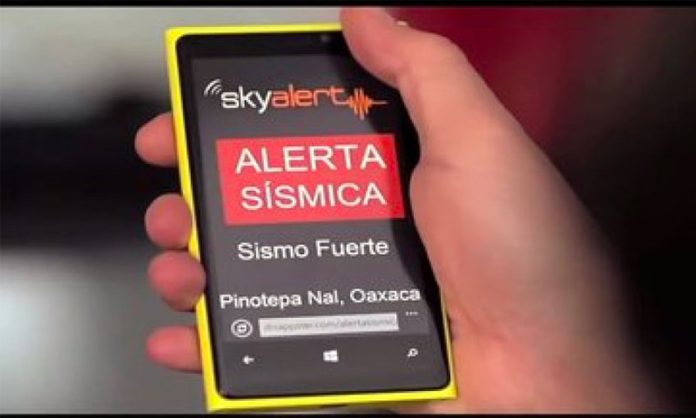The Mexico City government is locked in a feud with private technology startups over who can warn residents of an imminent earthquake.
Authorities in the capital issued a decree in August stating that the only entity authorized to send early earthquake alerts was the non-profit organization Center for Seismic Instrumentation and Registry, or Cires.
Cires’ 28-year-old system – the world’s oldest early earthquake warning service – gives Mexico City residents about a minute’s warning for most strong temblors whose epicenter is off the Pacific Coast – time that people can use to evacuate their homes, schools or office buildings.
The system is widely considered to be both fast and reliable but that hasn’t stopped two tech startups, Grillo and SkyAlert, from trying to develop an even better one.
Cires’ system relies on 96 sensors, most of which are placed on Mexico’s Pacific coast, that detect an earthquake’s seismic waves and transmits them via radio frequencies.
If a temblor is considered strong enough to cause damage, earthquake alerts are broadcast on television and radio and an alarm sounds in the capital from around 12,000 loudspeakers mounted on utility poles and 20,000 speakers in schools.
In contrast, Grillo and SkyAlert have adopted a more digital approach to earthquake monitoring, sending warnings more quickly via wireless internet, processing seismic data using cloud-computing and alerting people to approaching earthquakes via mobile apps, Twitter and in-home alarm systems.
While the startups’ services have proved popular – SkyAlert has 1.9 million Twitter followers – the Mexico City government says that having more than one alert system is confusing for residents and could undermine confidence in early earthquake alarms.
“If we continue to over-alert people, it will have two effects: we’ll lose people’s trust, and we’ll cause mass panic in places like subway cars or in large office buildings,” said Guillermo Ayala, a Civil Protection official who is responsible for natural disaster early warning efforts in Mexico City.
Two alerts issued by SkyAlert’s app in February and August overestimated the magnitude of earthquakes and caused tens of thousands of people to unnecessarily evacuate their workplaces, he said.
Ayala added that many private companies import cheap earthquake sensors from Asian countries without adapting them for use in Mexico.
“The point is not to prohibit the emission of seismic alerts,” he said. “The more support we have, the safer we will be, but only as long as all the alerts comply with the technical regulations,” he said.
In response to the criticism of SkyAlert – which imported sensors from Japan in 2016 and offers an alarm device for large buildings that costs about US $2,000 per year – the company’s founder told The Wall Street Journal that no early warning system is perfect.
Alejandro Cantú said that the government regulation that seeks to prevent private companies from issuing earthquake alerts “sends a terrible message” to people using technology to try to make people safer. More competition provides an incentive for alert systems to improve, he said.
“If we put in laws that limit innovation, we are doomed to forever have the same system that was installed years ago,” said Cantú, whose company also plans to bring in revenue by selling a premium mobile app.
The founder of Grillo, which operates a network of 50 Chinese-made sensors that it designed itself, told The Journal he is optimistic that the company will be able to comply with the Mexico City regulation.
Andrés Meira, an Anglo-Colombian architect, described the government’s decree as “vaguely worded” and said that Grillo intends to go ahead with a plan to sell small early-warning devices to homeowners for around US $50.
“The poorest people in Mexico live in the worst-designed houses, so you have to reach those people,” he said. “If you just sell early alert devices to a few large skyscrapers, you’re not going to save many lives.”
Source: The Wall Street Journal (en)
